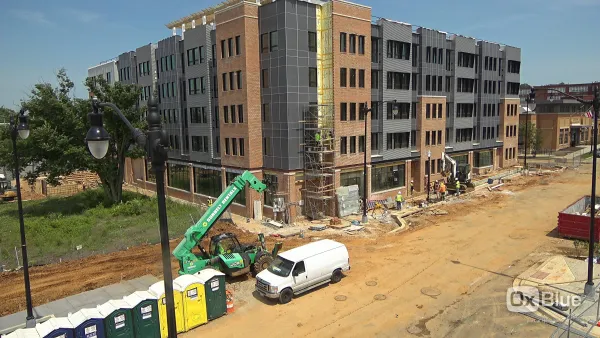Stan Cox argues that the massive square footage of so many modern houses -- no matter how "energy efficient" the construction -- is a luxury the planet can no longer afford.
"Monumental bad taste is indeed fascinating. But far more serious is the lasting environmental damage these incredible hulks do.
The manufacture and transportation of concrete to build a typical 3,000-square-foot house generate greenhouse gases amounting to 47 tons of carbon dioxide. And laid end to end, the pieces of lumber to make that house would stretch for more than four miles.
Wood, unlike concrete, gets some credit for being a "renewable" resource. The lumber and construction industries point out that they are taking greenhouse carbon out of the atmosphere and locking it into wood-frame houses. But that ignores the ecological effect of wrecking complex forest ecosystems to feed industrial wood production.
And in addition to requiring greater quantities of wood, concrete, plastics and copper, large houses have more volume to heat and cool, and more room for appliances and gadgets. Over a 50-year lifetime, a standard house pumps out greenhouse emissions amounting to 30 to 40 times the weight of the carbon that's socked away in its frame.
The bigger the house, the bigger the emissions. Based on University of Michigan figures, a typical 3,000-square-footer will emit as much carbon dioxide as would three - count ‘em, three - 16-miles-per-gallon SUVs driven the national vehicle average of 12,000 miles per year over 50 years.
Energy consumption is being addressed in a limited way by eco-friendly construction. But a 2005 analysis in the Journal of Industrial Ecology concluded that a 3,000-square-foot, super-efficient house consumes 50 percent more energy than does a 1,500-square-foot house built only to mediocre energy standards."
FULL STORY: SUVs Without Wheels

Maui's Vacation Rental Debate Turns Ugly
Verbal attacks, misinformation campaigns and fistfights plague a high-stakes debate to convert thousands of vacation rentals into long-term housing.

Planetizen Federal Action Tracker
A weekly monitor of how Trump’s orders and actions are impacting planners and planning in America.

San Francisco Suspends Traffic Calming Amidst Record Deaths
Citing “a challenging fiscal landscape,” the city will cease the program on the heels of 42 traffic deaths, including 24 pedestrians.

Defunct Pittsburgh Power Plant to Become Residential Tower
A decommissioned steam heat plant will be redeveloped into almost 100 affordable housing units.

Trump Prompts Restructuring of Transportation Research Board in “Unprecedented Overreach”
The TRB has eliminated more than half of its committees including those focused on climate, equity, and cities.

Amtrak Rolls Out New Orleans to Alabama “Mardi Gras” Train
The new service will operate morning and evening departures between Mobile and New Orleans.
Urban Design for Planners 1: Software Tools
This six-course series explores essential urban design concepts using open source software and equips planners with the tools they need to participate fully in the urban design process.
Planning for Universal Design
Learn the tools for implementing Universal Design in planning regulations.
Heyer Gruel & Associates PA
JM Goldson LLC
Custer County Colorado
City of Camden Redevelopment Agency
City of Astoria
Transportation Research & Education Center (TREC) at Portland State University
Jefferson Parish Government
Camden Redevelopment Agency
City of Claremont





























